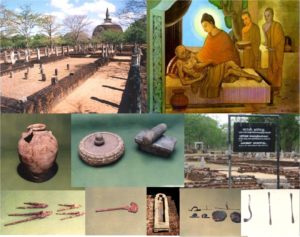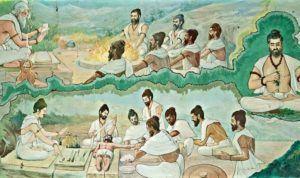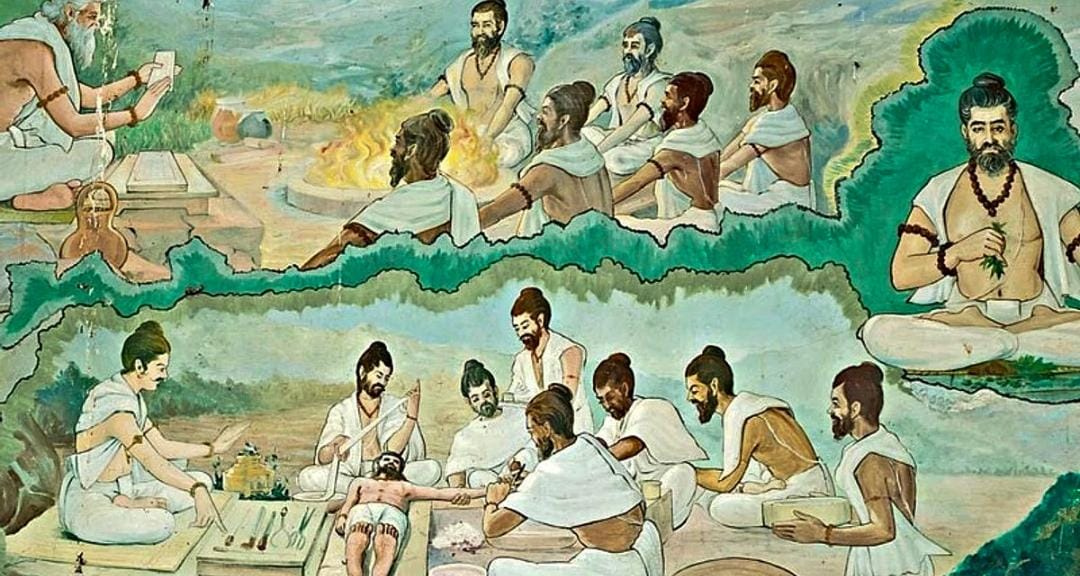Historical Roots of Ayurvedic Medicine in Sri Lanka
Ayurvedic medicine, a time-honored holistic healing system, is experiencing a resurgence in Sri Lanka. With its origins rooted in the Sanskrit language, Ayurveda combines ancient wisdom and scientific knowledge to promote overall wellbeing. Sri Lanka, known for its cultural heritage and close ties to India, boasts a longstanding tradition of Ayurvedic medicine that remains vibrant to this day. This article delves into the historical roots of Ayurvedic medicine in Sri Lanka, tracing its evolution and exploring its enduring impact on the country’s healthcare system.
Ancient Beginnings
The origins of Ayurvedic medicine can be traced back over 5,000 years to the Indian subcontinent. Sri Lanka shares a close historical and cultural relationship with India, and it is believed that Ayurveda was introduced to the island by Indian settlers and traders. The early inhabitants of Sri Lanka embraced Ayurvedic principles, blending them with indigenous healing practices. This fusion created a unique Sri Lankan Ayurvedic tradition that was influenced by various cultures and traditions over the centuries.
Influence of Buddhism
Buddhism played a critical role in the development of Ayurvedic medicine in Sri Lanka. With the arrival of Buddhism on the island in the 3rd century BCE, Ayurveda became closely intertwined with Buddhist teachings and practices. Monastic traditions and ancient texts like the “Dhammasangani” included references to medicinal herbs and healing methods. Monks and scholars of the time played a crucial role in preserving and transmitting Ayurvedic knowledge.

Ancient Texts and Practices
Sri Lanka has its own set of Ayurvedic texts and manuscripts, such as the “Sarartha Sangrahaya” and the “Yukti Dipika.” These texts provide insights into the unique Sri Lankan Ayurvedic practices, including the use of indigenous herbs and remedies. Traditional healers, known as “vedaralas,” have passed down their knowledge through generations, ensuring the continuity of this ancient healing tradition.
Integration with Modern Healthcare
Throughout its history, Ayurvedic medicine in Sri Lanka has faced challenges and undergone transformations. During the colonial period, British colonial rulers attempted to marginalize traditional healing practices in favor of Western medicine. However, Ayurveda persisted, and in the post-independence era, there has been a resurgence of interest in Ayurvedic medicine.
Today, Ayurvedic medicine is an integral part of Sri Lanka’s healthcare system. The government has established Ayurvedic hospitals and dispensaries across the country, where patients can receive traditional treatments and therapies. Many Sri Lankan universities offer degree programs in Ayurveda, and research into its efficacy and safety continues to expand.
Enduring Influence
The historical roots of Ayurvedic medicine continue to shape healthcare practices in Sri Lanka. People in Sri Lanka and around the world seek Ayurvedic treatments for various ailments, and its principles have been integrated into modern wellness practices. Yoga and meditation, fundamental aspects of Ayurveda, have gained popularity not only for physical health but also for mental and spiritual well-being.
Colonial impact on traditional medicine
Sri Lanka’s Ayurveda system, with its deep historical roots, has experienced a resurgence in recent years, supported by government initiatives, a global trend toward holistic health, international recognition, and evolving contemporary practices. This explores how Sri Lanka has leveraged these factors to promote and preserve its Ayurvedic heritage.
Government Support and Policies
Sri Lanka’s government has recognized the potential of Ayurveda as a significant contributor to both healthcare and tourism sectors. To bolster this traditional system of medicine, the government has implemented several key policies and initiatives:
Establishment of Ayurveda Hospitals and Dispensaries: The government has set up Ayurveda hospitals and dispensaries across the country, offering traditional treatments and therapies to patients. These facilities provide affordable healthcare options and encourage the use of Ayurveda.
Integration into the Healthcare System: Ayurveda is now integrated into the national healthcare system, allowing patients to access Ayurvedic treatments alongside modern medicine. This inclusive approach enhances the credibility of Ayurveda and ensures its wider adoption.
Promotion of Ayurveda Education: Sri Lankan universities and institutions offer degree programs in Ayurveda, producing a skilled workforce of Ayurvedic practitioners. This initiative not only elevates the standards of practice but also creates employment opportunities.
Growing Interest in Natural and Holistic Health
The global trend towards natural and holistic health practices has further propelled Ayurveda’s popularity in Sri Lanka:
Preference for Natural Remedies: In the wake of growing concerns about the side effects of pharmaceutical drugs, many people are turning to Ayurveda for its natural remedies and therapies, which are perceived as safer and more sustainable.
Yoga and Meditation: Ayurveda’s emphasis on yoga and meditation aligns with the contemporary interest in mental and emotional well-being. Retreat centers and wellness spas that offer Ayurvedic practices have gained popularity among locals and tourists alike.
International Recognition and Tourism
Sri Lanka’s Ayurveda system has garnered international recognition, making it an attractive destination for wellness tourism:
Certification and Accreditation: Sri Lanka has been actively seeking international certification and accreditation for its Ayurveda facilities, which enhances the credibility of its offerings in the global wellness market.
Wellness Tourism: The country has tapped into the booming wellness tourism industry by promoting Ayurveda retreats and wellness centers. Visitors from around the world flock to Sri Lanka to experience traditional Ayurvedic treatments amidst serene natural surroundings.
Contemporary Ayurvedic Practices and Treatments
Sri Lanka has adapted Ayurvedic practices to suit modern needs and preferences:
Personalized Wellness Plans: Ayurvedic practitioners in Sri Lanka now offer personalized wellness plans tailored to individuals’ specific health goals and needs, combining traditional wisdom with modern diagnostic techniques.
Integration with Modern Medicine: Sri Lankan healthcare providers increasingly integrate Ayurveda with modern medicine, recognizing the complementary nature of the two systems. This integrated approach enhances patient care and outcomes.
Overview of common Ayurvedic treatments and therapies
Sri Lanka, with its rich historical connection to Ayurveda, has become a global hub for Ayurvedic treatments and therapies. This provides an overview of common Ayurvedic treatments and therapies in Sri Lanka, highlighting their integration with modern healthcare practices and the role they play in the booming wellness tourism industry.
Common Ayurvedic Treatments and Therapies
Panchakarma: Panchakarma is one of the most renowned Ayurvedic therapies in Sri Lanka. It involves a detoxification process that aims to remove toxins from the body through techniques like Vamana (emesis), Virechana (purgation), Basti (enema), Nasya (nasal therapy), and Raktamokshana (bloodletting). Panchakarma is believed to rejuvenate the body, enhance vitality, and promote overall well-being.
Abhyanga: Abhyanga is a form of therapeutic oil massage that involves the use of specific herbal oils tailored to an individual’s constitution (Prakriti) and health condition (Vikriti). It is known for its relaxing and rejuvenating properties and is often used for stress relief and improving skin health.
Shirodhara: Shirodhara is a soothing treatment where warm herbal oil is gently poured in a continuous stream onto the forehead (the “third eye” area). It is believed to calm the mind, alleviate stress, and promote mental clarity.
Herbal Steam Bath (Swedana): Swedana therapy involves exposing the body to herbal steam to induce sweating, thereby eliminating toxins and improving circulation. It is used for various purposes, including pain relief and relaxation.
Dietary and Lifestyle Guidance: Ayurvedic treatments in Sri Lanka often include dietary recommendations tailored to an individual’s dosha (constitution) and health condition. This holistic approach emphasizes the importance of maintaining a balanced lifestyle and diet for overall health.
Integration with Modern Healthcare
Sri Lanka has successfully integrated Ayurvedic treatments with modern healthcare, providing patients with a comprehensive approach to wellness:
Combined Healthcare Facilities: Many hospitals and healthcare centers in Sri Lanka offer both modern medical treatments and Ayurvedic therapies. This integration allows patients to access the best of both worlds, combining the precision of Western medicine with the holistic approach of Ayurveda.
Collaborative Approach: Physicians in Sri Lanka often collaborate across disciplines, discussing cases and recommending complementary treatments when appropriate. This approach enhances patient care and can lead to more effective and personalized treatment plans.
Ayurveda and Wellness Tourism
Sri Lanka has embraced Ayurveda as a key component of its thriving wellness tourism industry:
Wellness Retreats: The country offers numerous wellness retreats and resorts that focus on Ayurvedic treatments and therapies. Tourists from around the world flock to Sri Lanka to experience the healing benefits of Ayurveda in serene and natural settings.
Spa and Wellness Centers: Sri Lanka’s spa and wellness industry prominently features Ayurvedic treatments. These centers offer a range of experiences, from traditional massages to full Ayurvedic wellness programs.
International Recognition: Sri Lanka’s Ayurvedic facilities are gaining international recognition and certification, further boosting its appeal to wellness tourists seeking authentic Ayurvedic experiences.

The role of Ayurveda in Sri Lanka’s tourism industry
Sri Lanka’s tourism industry has experienced significant growth in recent years, with visitors from around the world seeking unique cultural and wellness experiences. A prominent component of this tourism boom is Ayurveda, an ancient holistic healing system that has been thriving in Sri Lanka. This explores the essential role of Ayurveda in Sri Lanka’s tourism industry, examining its economic impact, sustainability, and the challenges and concerns it faces.
Economic Impact
Ayurveda plays a pivotal role in driving Sri Lanka’s tourism industry on multiple fronts:
Diversification of Tourism: Ayurveda attracts a niche segment of wellness tourists seeking holistic experiences. This diversification reduces the country’s reliance on mass tourism, contributing to a more resilient tourism sector.
Revenue Generation: Ayurvedic wellness retreats, spa centers, and treatment facilities generate substantial revenue for the country. These businesses employ a significant number of people, thereby contributing to employment and income generation.
Foreign Exchange Earnings: Wellness tourists who come to Sri Lanka for Ayurveda treatments bring in foreign exchange earnings, bolstering the nation’s economic stability.
Sustainability
Ayurveda in Sri Lanka offers a sustainable model for tourism in several ways:
Cultural Preservation: Ayurveda’s integration into the tourism industry helps preserve and promote Sri Lanka’s rich cultural heritage. It encourages the transmission of traditional knowledge and practices to younger generations.
Natural Resource Utilization: Ayurveda relies on natural resources, such as indigenous herbs and sustainable farming practices. This promotes responsible resource utilization and contributes to environmental conservation.
Community Involvement: Ayurvedic tourism often involves local communities, from traditional healers to farmers supplying herbs. This inclusive approach ensures that benefits are distributed across society, reducing economic disparities
Challenges and Concerns
Despite its positive impact, Ayurveda in Sri Lanka’s tourism industry faces certain challenges and concerns:
Quality Control: Ensuring the quality and authenticity of Ayurvedic treatments is essential. There is a need for stringent regulation and certification to prevent unscrupulous practices.
Standardization: The lack of standardized practices and treatment protocols across Ayurvedic centers can lead to inconsistencies in visitor experiences. Standardization efforts are essential to maintain the industry’s reputation.
Environmental Impact: The demand for Ayurvedic herbs and ingredients can put pressure on local ecosystems. Sustainable harvesting and farming practices are crucial to mitigate these environmental impacts.
Tourist Expectations: Meeting the expectations of wellness tourists can be challenging. Effective communication and clear information about Ayurveda’s benefits and limitations are essential.
Competition and Price Sensitivity: The global wellness tourism market is competitive, and price sensitivity among tourists can pose challenges for Sri Lankan Ayurveda centers.
Quality control and standardization in Ayurvedic medicine
Quality Control and Standardization
Regulatory Framework: Sri Lanka has taken steps to regulate Ayurvedic medicine, establishing the Department of Ayurveda to oversee standards and practices. However, enforcing these regulations, particularly in smaller, traditional practices, remains a challenge.
Certification and Accreditation: The development of certification and accreditation processes for Ayurvedic practitioners and facilities is crucial for ensuring quality control and standardization. Sri Lanka should continue efforts to align its Ayurvedic practices with international standards.
Herbal Product Quality: Ensuring the quality of herbal medicines and remedies used in Ayurveda is essential. Quality control measures, including testing for purity and potency, should be implemented throughout the supply chain, from cultivation to preparation.
Ethical Issues and Cultural Appropriation
Cultural Appropriation: As Ayurveda gains global popularity, the risk of cultural appropriation increases. It is essential to respect and acknowledge the cultural and historical significance of Ayurveda, ensuring that practices are not misappropriated or commodified.
Intellectual Property Rights: Protecting traditional knowledge is a critical ethical concern. Sri Lanka should explore legal mechanisms to safeguard its indigenous Ayurvedic wisdom and prevent the misappropriation of traditional formulations and practices.
Integration with Western Medicine
Complementary Approach: The integration of Ayurvedic medicine with Western medicine can offer patients a comprehensive and holistic approach to healthcare. Collaboration between Ayurvedic practitioners and Western healthcare providers can improve patient outcomes.
Research and Evidence-Based Practices: To facilitate integration, more research is needed to establish the safety and efficacy of Ayurvedic treatments. This requires rigorous scientific studies to provide evidence-based support for Ayurveda’s role in modern healthcare.
Future Prospects and Research Directions
Research Funding: Investing in research and development is essential for the future of Ayurvedic medicine in Sri Lanka. Government funding and international collaborations can support research initiatives to validate Ayurvedic practices and remedies.
Standardized Treatment Protocols: Developing standardized treatment protocols can enhance the credibility and consistency of Ayurvedic medicine. These protocols should incorporate traditional knowledge while aligning with modern healthcare standards.
Global Collaboration: Sri Lanka can benefit from collaborating with other countries that have strong traditions of herbal medicine, such as India and China. Sharing knowledge and experiences can advance the field and address common challenges.
Potential for Ayurvedic medicine in global healthcare
Ayurvedic medicine, one of the world’s oldest holistic healing systems, has garnered increasing attention in recent years as a complementary and alternative approach to healthcare. Its potential for global healthcare is significant, driven by ongoing research and development efforts and a growing body of case studies and success stories. This explores Ayurvedic medicine’s potential in the global healthcare landscape, focusing on areas of ongoing research and development and highlighting successful applications.
Ayurvedic Medicine’s Global Potential
Holistic Approach: Ayurveda’s holistic approach to health, addressing the physical, mental, and emotional aspects of well-being, resonates with individuals seeking comprehensive and patient-centered healthcare. This aligns with the global shift towards patient empowerment and personalized medicine.
Natural and Non-Invasive: Ayurvedic treatments primarily employ natural remedies, dietary modifications, lifestyle changes, and therapeutic practices like yoga and meditation. This appeals to those seeking non-invasive and natural alternatives to pharmaceuticals and surgery.
Preventive Healthcare: Ayurveda emphasizes preventive healthcare by promoting balance and harmony in the body. This proactive approach aligns with the global trend towards preventive and lifestyle medicine.
Areas of Ongoing Research and Development
Clinical Trials and Evidence-Based Practices: To gain acceptance in the global healthcare arena, Ayurvedic medicine is undergoing rigorous scientific scrutiny. Clinical trials and research studies are exploring the safety and efficacy of Ayurvedic treatments for various health conditions.
Herbal Medicine and Phytochemistry: Research into the pharmacological properties of Ayurvedic herbs and formulations is ongoing. Modern techniques in phytochemistry and molecular biology are shedding light on the mechanisms of action of herbal remedies.
Integration with Modern Medicine: Ayurvedic medicine is increasingly being integrated with modern healthcare systems in various countries. Research in this area focuses on developing standardized protocols and guidelines for the safe and effective combination of Ayurveda with conventional medicine.
Case Studies and Success Stories
Kerala, India: Kerala, known as the “Land of Ayurveda,” has successfully integrated Ayurvedic treatments into its healthcare system. The state’s Ayurvedic centers and hospitals attract patients from around the world seeking treatments for chronic conditions, rejuvenation, and wellness.
Sri Lanka: Sri Lanka’s Ayurveda industry has gained international recognition through wellness tourism. Many wellness resorts and retreats offer traditional Ayurvedic treatments, attracting visitors looking for holistic healthcare experiences.
USA and Europe: Ayurvedic clinics and practitioners are gaining popularity in Western countries. Patients are seeking Ayurvedic consultations and treatments for various conditions, including stress management, digestive disorders, and chronic illnesses.
Influence of Ayurveda on Sri Lankan culture and identity
- Influence of Ayurveda on Sri Lankan Culture and Identity
Historical Roots: Ayurveda’s presence in Sri Lanka dates back centuries, making it an integral part of the island’s cultural heritage. As one of the world’s oldest medical systems, Ayurveda has not only shaped healthcare practices but also contributed to Sri Lanka’s sense of identity.
Cultural Practices: Ayurveda has influenced various aspects of Sri Lankan culture, from traditional medicine and herbal remedies to dietary habits and lifestyle choices. Ayurvedic principles guide the preparation of traditional dishes and herbal remedies used in daily life.
Religious Significance: Ayurveda is closely linked to Buddhism, which plays a central role in Sri Lankan culture. Buddhist monks and scholars have been custodians of Ayurvedic knowledge, and Ayurveda’s holistic approach aligns with Buddhist principles of balance and well-being.
- Social Acceptance and Community Engagement
Widespread Acceptance: Ayurveda enjoys widespread acceptance and trust among the Sri Lankan population. Many Sri Lankans turn to Ayurvedic remedies and treatments for various health issues, viewing them as effective and safe alternatives to modern medicine.
Community Engagement: Sri Lanka has a thriving community of traditional healers known as “vedaralas.” These practitioners engage directly with local communities, passing down Ayurvedic knowledge and providing healthcare services. Their presence ensures Ayurveda remains deeply rooted in society.
Integration into Healthcare: Ayurveda is seamlessly integrated into Sri Lanka’s healthcare system. Ayurvedic hospitals and dispensaries offer traditional treatments alongside modern medicine, allowing patients to choose the approach that aligns with their beliefs and preferences.
Conclusion and Implications
The influence of Ayurveda on Sri Lankan culture and identity is undeniable. This ancient healing system has become an integral part of daily life, shaping dietary choices, cultural practices, and even religious customs. The social acceptance of Ayurveda and active community engagement ensure its continued relevance in Sri Lankan society.
The implications of Ayurveda’s influence on Sri Lankan culture and identity are profound. It fosters a sense of pride in the nation’s rich heritage and traditional knowledge. Moreover, it contributes to a holistic approach to healthcare and well-being, emphasizing balance and harmony, which aligns with the broader principles of Sri Lankan culture and identity.
As Sri Lanka continues to embrace and promote Ayurveda, it not only preserves its cultural heritage but also offers its citizens a comprehensive and culturally resonant approach to healthcare. This integration can serve as a model for other countries seeking to combine traditional wisdom with modern healthcare practices, ultimately benefiting society as a whole.
Summarizing the resurgence of Ayurvedic medicine in Sri Lanka
The resurgence of Ayurvedic medicine in Sri Lanka is marked by a renewed fascination with traditional healing practices and a holistic approach to wellness. This revival is driven by various factors, including government backing, an increasing global interest in natural and alternative medicine, and the acknowledgment of Ayurveda’s cultural and historical importance. Ayurveda has now been integrated into the national healthcare system, providing patients with a complementary approach to modern medicine. Additionally, this resurgence has given rise to the development of wellness tourism, attracting visitors who seek authentic Ayurvedic experiences. Overall, Ayurvedic medicine in Sri Lanka has undergone a revival that promotes wellness and safeguards cultural heritage.
Dr. Sunethra Mallikarachchi
(Dr. B.I.M.S Sunethra Mallikarachchi is a distinguished expert in Ayurvedic medicine based at the Faculty of Indigenous Medicine, University of Colombo. With a profound knowledge of this ancient healing tradition, Dr. Mallikarachchi is renowned for her insightful research contributions to the field. Her upcoming research article promises to offer valuable insights into the profound impact of Ayurvedic medicine on human health and well-being. As a faculty member, Dr. Mallikarachchi continues to inspire aspiring scholars and practitioners, showcasing the timeless wisdom of Ayurveda in today’s healthcare landscape. Her work stands as a testament to the enduring relevance and efficacy of this holistic approach to wellness)
Reference
- https://siddhalepa.com/index.php/ayurveda-in-sri-lanka/
- https://ayurveda.gov.lk/
- https://en.wikipedia.org/wiki/Sri_Lankan_traditional_medicine
- https://pubmed.ncbi.nlm.nih.gov/7464187/
- https://www.srilanka.travel/wellness-tourism/history.php




